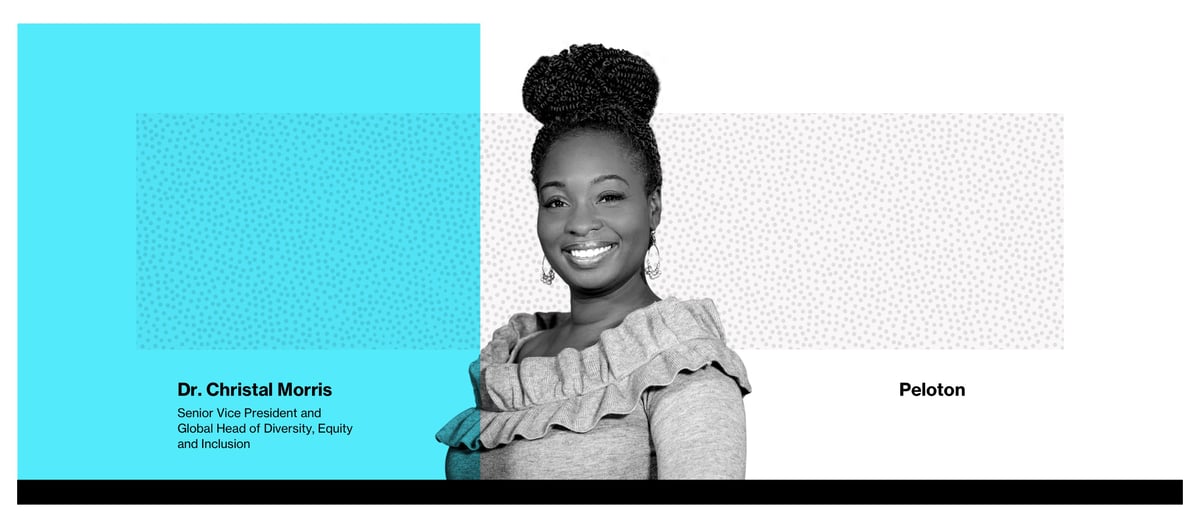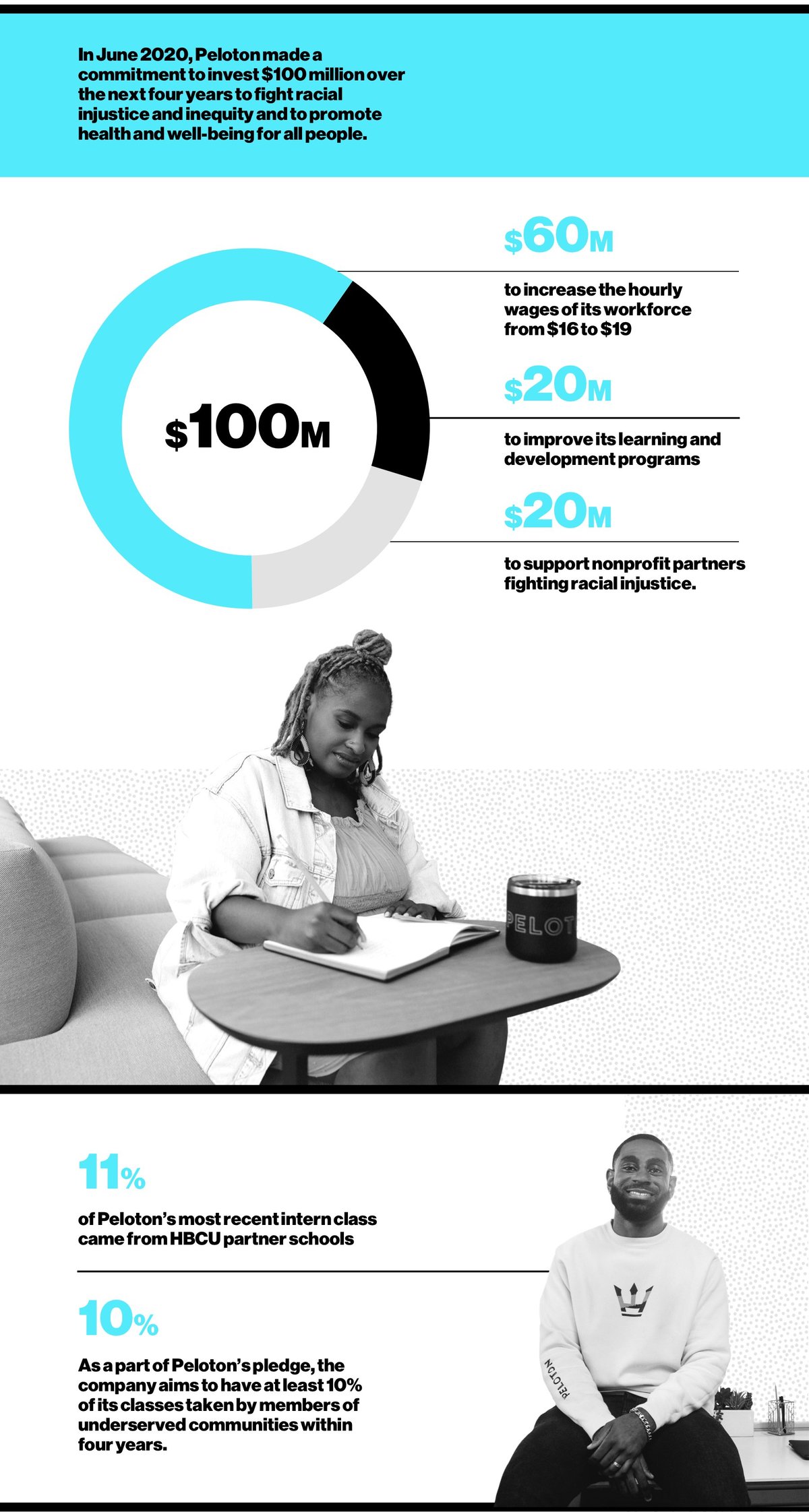
Peloton Makes a Powerful Commitment to Anti-Racism and Access to Fitness
In 2020, Peloton sales surged 232% year-over-year to $759.7 million, as the global demand for its bikes and treadmills rose during the pandemic, according to Bloomberg. This unprecedented growth for Peloton coincided with the deaths of George Floyd and Breonna Taylor and other Black Americans at the hands of police officers, providing the New York-based company an opportunity to use its platform as a growing health and wellness business to attack racial inequality.
In June 2020, Peloton made a commitment to invest $100 million over the next four years to fight racial injustice and inequity and to promote health and well-being for all people. Within the pledge, the company committed $60 million to increase the wages of its hourly workforce from $16 to $19; $20 million to improve its learning and development programs; and $20 million to support nonprofit partners fighting racial injustice.
The company also donated $500,000 to the NAACP Legal Defense and Education Fund and has urged its followers on social media to stand with the Black community. Currently, Peloton has more than 260,000 members who are using the #BlackLivesMatter hashtag on its platform. The company's commitment to social justice and racial equity is reinforced by its commitment to CEO Action for Diversity & Inclusion™, which brings together nearly 2,000 CEOs and thousands of CHROs and CDOs who have pledged to drive measurable action and meaningful change in advancing diversity, equity and inclusion in the workplace.
“I haven’t been blind to injustices and inequality in our society,” said John Foley, Peloton’s CEO and co-founder, in announcing the pledge. “They’ve been plain to see my entire life. What has also been true for decades is that we must proactively reduce inequality, with a particular emphasis on reducing the persistent disparities experienced in our Black communities. This is the work of anti-racism, and the journey for Peloton begins now.”

One of the actions Peloton implemented as part of this new commitment was to expand its DE&I team. In January, the company hired Dr. Christal Morris as its new Senior Vice President and Global Head of Diversity, Equity and Inclusion. As head of her own DE&I consulting firm prior to coming to Peloton, Morris had facilitated discussions with C-suite leaders on how to talk about race inside their organizations.
“I commend Peloton for realizing the importance of needing someone to lead and champion its DEI efforts, including formulating a vision and strategy, serving as Executive Sponsor of the pledge, pulling all of the various teams together, and making sure that DEI is aligned with our business priorities,” Morris says. “We wanted to be very thoughtful about how Peloton shows up in the world and in our communities, and ensure that our team members internally feel like they can fully show up as their authentic selves—while also ensuring our members buying our products have a way of attaching themselves to our brand and seeing themselves reflected through our content and music.”
Prioritizing an aggressive DE&I strategy through rapid growth
In 2019, Peloton’s shares fell 11% on the first day of trading, and it was losing 21 cents on every dollar of sales; according to Citron Research, the company was worth $1.4 billion or about $5 a share. But after sales more than tripled year-over-year, accelerated by people buying Peloton products to use at home during the lockdown, the company had a market value of more than $48 billion by January 2021, according to Bloomberg, with more than 5.9 million members and sales of over 1 million bikes and treadmills.
The company was booming, and it had the opportunity and responsibility to align this growth with its aggressive anti-racism campaign, and to make DE&I central to its overall business strategy.
“We were experiencing exponential growth, and now it’s time to think about how we prioritize this work and make it an integral part of everything we do,” Morris recalls. “This work has been one of the biggest strategic priorities that our leaders and teammates are championing. Operationalizing and embedding DEI into our core processes, literally, into everything we do, while in the midst of running and growing our business, has been really critical for us.”
Partnering with Beyoncé to connect with HBCUs
Since the social unrest of the summer of 2020, historically Black colleges and universities have been a focal point of private-sector philanthropy aimed at addressing systemic racism and inequality.
Through a partnership with Beyoncé, Peloton provides two-year digital memberships to students at 10 HBCUs. The program has already had an impact on multiple levels, as more Black students have joined the Peloton platform and the HBCUs continue to serve as a talent pipeline for employment at the company.
Morris says that 11% of Peloton’s most recent intern class came from HBCU partner schools, and she is confident that will increase during their next intern cycle. Since November, the company has welcomed thousands of HBCU students into the Peloton community.
“We love the fact that we have this connection to HBCU students who can now leverage the platform to engage with one another and build community,” says Morris. “As we think about access to fitness and ensuring that people have the opportunity to support and motivate each other, combined with the new strategic relationships we’ve built with over 10 HBCUs—we’ve really seen some good synergy there. We’re expanding these partnerships as we consider our DEI strategy, how we look at our sustainability work, and then, of course, how we recruit diverse talent. So, the partnerships have completely exploded in the way that we can now tap into a differentiated pipeline.”
Democratizing health and wellness
The marriage of anti-racism work with selling bikes, treadmills and subscriptions is a core business strategy of Peloton, which is committed to democratizing health and wellness. Covid has highlighted some of the striking health disparities affecting Black and Latino communities. As a part of Peloton’s pledge, the company aims to have at least 10% of its classes taken by members of underserved communities within four years.
“Our research has shown that one of the key barriers to wellness faced by racially marginalized communities is access to a safe place to work out,” Morris says.
Through a partnership with LISC, a nonprofit dedicated to closing racial, health, wealth and opportunity gaps, Peloton will donate fitness products to help create safe and inclusive places for fitness. Peloton has also worked hard to ensure that the starting costs of its bikes and treadmills are not a financial barrier to joining their community. (Peloton bikes start at $1,495, and the Tread+ treadmill is $4,295; the new Tread, is $2,495.)
“It’s a priority for us to make potential members aware of the breadth of content they have access to via the Peloton app across so many fitness modalities,” says Letena Lindsay, Peloton’s Vice President of Global Communications. “It’s important that people know they can access our content without needing our hardware, using their own equipment, for instance, if they have it at home. There are strength classes, yoga, stretching and so many other offerings.”
What does it mean to be anti-racist?
Peloton has partnered with Boston University’s Center for Antiracist Research, where Ibram X. Kendi is the director. Kendi, author of the best-selling Stamped from the Beginning: The Definitive History of Racist Ideas in America and How to Be an Antiracist, will work with Peloton in a yearlong initiative to understand the intersection of racial equity, mental health and physical fitness.
Kendi was a guest speaker as part of Peloton’s Brave Conversations, a quarterly, company-wide speaker series on race and equity, which was also a part of Peloton’s broader antiracism learnings and speaker series.
“We know that the human experience is not monolithic, and we want our teammates to understand what it means to be an antiracist, and that it must be active, not passive,” Morris says. “So there were lots of ‘Aha’ moments in the chatter around, ‘Huh? Maybe I’ve been leaning on my Black colleagues a lot to explain things to me, but I have to do the work myself.’ As a result, we saw a lot of learning, growing, and understanding around how to listen empathetically to ensure Peloton team members felt heard, seen and valued and could show up authentically. Even in spaces that maybe you don’t think impact you, they may be impacting the colleague that sits right next to you.”
Empowering communities with fitness and wellness
Partnerships with GirlTrek—the largest public health nonprofit for Black women and girls in the U.S.—LISC, The Steve Fund and the Women’s Housing and Economic Development Corporation (WHEDco) are allowing Peloton to make deep inroads to assist communities experiencing racial and economic inequality. With WHEDco, a Black-led affordable housing developer and community development organization in New York City, Peloton will launch a new fitness space, with its equipment and programming, in the organization’s Bronx Commons housing development.
Peloton has important and specific metrics for its work with these partners, but it takes a macro view of promoting anti-racism within the company and across its global platform.
“The fact that Peloton is now associated with anti-racism and equity is impactful,” Lindsay says. “The fact that people come to our platform and connect us with this important work is impactful because it allows us as a brand to really change hearts and minds. We’re not going to change everyone, but if somebody who never thought about anti-racism and what it is like to be a person of color, or live in a different way, is now being thoughtful about that—that’s creating impact; that is success.”
